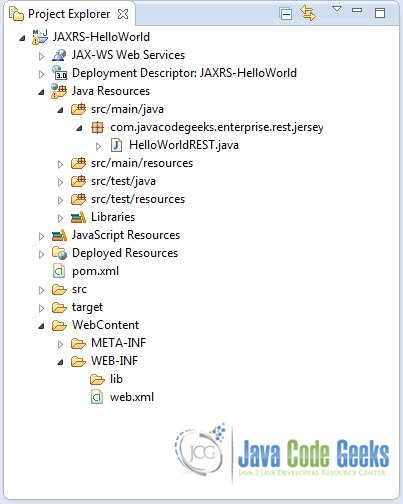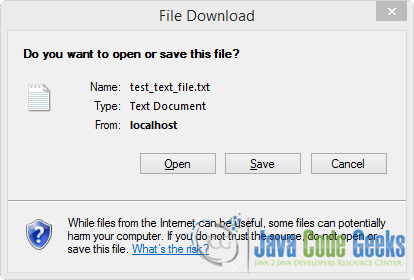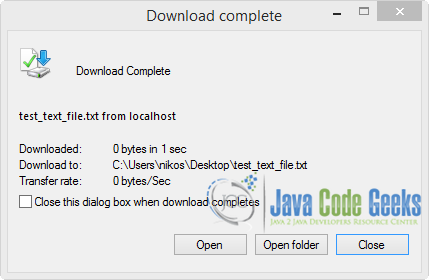JAX-RS Download File
In this example we are going to see how you can download a file from a JAX-RS REST Service. It’s significantly easy to do that, as it requires to annotate the bind method with the @Produces annotation. The @Produces annotation can used to used to specify the MIME media types a service can produce and send to the client. In this example we are going to see how you can download text, image, PDF and excel files.
The second thing to note is that you have to attach the file to the response and then set the Content-Disposition header variable of the response. The Content-Disposition response-header field is used to dictate a a default file name if the user requests that the content is saved to a file. A simple example would be : Content-Disposition: attachment; filename="fname.ext". Using this, the user-agent will not display the response, but directly the pop up “Save as…” dialogue.
In this example we are not going to focus on how to create JAX-RS application from top to bottom. So make sure you read carefully Jersey Hello World Example and RESTEasy Hello World Example, and pay attention to the sections concerning the creation of the project with Eclipse IDE as well as the deployment of the project in Tomcat.
The code of this tutorial is going to be based on Jersey Hello World Example. You can download the Eclipse project of this tutorial here : JAXRS-HelloWorld.zip
1. Project structure
Let’s remind ourselves the structure of the project we are working on:
The code presented in this new tutorial will only concern HelloWorldREST.java file.
At this point you can also take a look at the web.xml file to see how the project is configured:
web.xml:
<?xml version="1.0" encoding="UTF-8"?>
<web-app xmlns:xsi="http://www.w3.org/2001/XMLSchema-instance" xmlns="http://java.sun.com/xml/ns/javaee" xsi:schemaLocation="http://java.sun.com/xml/ns/javaee http://java.sun.com/xml/ns/javaee/web-app_3_0.xsd" id="WebApp_ID" version="3.0">
<display-name>Restful Web Application</display-name>
<servlet>
<servlet-name>jersey-helloworld-serlvet</servlet-name>
<servlet-class>
com.sun.jersey.spi.container.servlet.ServletContainer
</servlet-class>
<init-param>
<param-name>com.sun.jersey.config.property.packages</param-name>
<param-value>com.javacodegeeks.enterprise.rest.jersey</param-value>
</init-param>
<load-on-startup>1</load-on-startup>
</servlet>
<servlet-mapping>
<servlet-name>jersey-helloworld-serlvet</servlet-name>
<url-pattern>/rest/*</url-pattern>
</servlet-mapping>
</web-app>As you can see our servlet is mapped to /rest/ URI pattern. So the basic structure of the URIs used in this example will have the form :
http://localhost:8080/JAXRS-HelloWorld/rest/....
2. Download a text file
HelloWorldREST.java:
package com.javacodegeeks.enterprise.rest.jersey;
import java.io.File;
import javax.ws.rs.GET;
import javax.ws.rs.Path;
import javax.ws.rs.Produces;
import javax.ws.rs.core.Response;
import javax.ws.rs.core.Response.ResponseBuilder;
@Path("/files")
public class HelloWorldREST {
// The file paths of the files in the server
private static final String TXT_FILE = "C:\\Users\\nikos\\Desktop\\TEST_FILES\\test.txt";
@GET
@Path("/txt")
@Produces("text/plain")
public Response getTextFile() {
File file = new File(TXT_FILE);
ResponseBuilder response = Response.ok((Object) file);
response.header("Content-Disposition", "attachment; filename=\"test_text_file.txt\"");
return response.build();
}
}When you put on your browser:
http://localhost:8080/JAXRS-HelloWorld/rest/files/txt
In most browsers you will get a pop up “Save as…” dialog:
And if you press save you will be prompted to open the file:
If you have specified a default folder for your downloads in your browser, the file will be automatically downloaded without any dialogue boxes (in most cases).
3. Download other file formats
To download different file formats all you have to do is change the type registered in @Produces annotation.
@Produces("image/png")for images (you can change the “png” part according to the format of the image).@Produces("application/pdf")for PDF files.@Produces(“application/vnd.ms-excel”)for Excel files.
HelloWorldREST.java:
Here is the complete code for all the above cases:
package com.javacodegeeks.enterprise.rest.jersey;
import java.io.File;
import javax.ws.rs.GET;
import javax.ws.rs.Path;
import javax.ws.rs.Produces;
import javax.ws.rs.core.Response;
import javax.ws.rs.core.Response.ResponseBuilder;
@Path("/files")
public class HelloWorldREST {
// The file paths of the files in the server
private static final String TXT_FILE = "C:\\Users\\nikos\\Desktop\\TEST_FILES\\test.txt";
private static final String IMAGE_FILE = "C:\\Users\\nikos\\Desktop\\TEST_FILES\\test.png";
private static final String PDF_FILE = "C:\\Users\\nikos\\Desktop\\TEST_FILES\\test.pdf";
private static final String EXCEL_FILE = "C:\\Users\\nikos\\Desktop\\TEST_FILES\\test.xls";
/**
* Download Text File
*/
@GET
@Path("/txt")
@Produces("text/plain")
public Response getTextFile() {
File file = new File(TXT_FILE);
ResponseBuilder response = Response.ok((Object) file);
response.header("Content-Disposition", "attachment; filename=\"test_text_file.txt\"");
return response.build();
}
/**
* Download Image File
*/
@GET
@Path("/images")
@Produces("image/png")
public Response getImageFile() {
File file = new File(IMAGE_FILE);
ResponseBuilder response = Response.ok((Object) file);
response.header("Content-Disposition", "attachment; filename=\"test_image_file.png\"");
return response.build();
}
/**
* Download PDF File
*/
@GET
@Path("/pdf")
@Produces("application/pdf")
public Response getPDF() {
File file = new File(PDF_FILE);
ResponseBuilder response = Response.ok((Object) file);
response.header("Content-Disposition", "attachment; filename=\"test_PDF_file.pdf\"");
return response.build();
}
/**
* Download Excel File
*/
@GET
@Path("/excel")
@Produces("aapplication/vnd.ms-excel")
public Response getExcell() {
File file = new File(EXCEL_FILE);
ResponseBuilder response = Response.ok((Object) file);
response.header("Content-Disposition", "attachment; filename=\"test_excel_file.xls\"");
return response.build();
}
}Download Eclipse Project
This was an example on how to download files form a JAX-RS REST Service. Download the Eclipse Project of this example : JAXRS-FileDownload.zip





